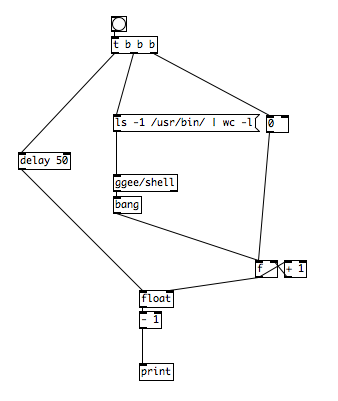-
Spyros
posted in technical issues • read more@jameslo ace! you are a star. thank you so much for the detailed replay!
-
Spyros
posted in technical issues • read more@jameslo thank you very much for your response!
- In the abstraction I replaced all the inlets to [receive] and [send] from the main, the [inlet~]s to [receive~] and [send~] from the main and the [outlet~] to [dac~]
- in the main I created [pd~] and I am sending a message <pd~ start pd~-button.pd> calling the abstraction button.pd. But I get an error: "pd~-button.pd: can't open" (in a separate instance of Pd). The weird thing is that when I go to help of [pd~] and click on the message <pd~ start pd~-subprocess.pd> I don't get the error when I copy and past the help in my main.pd I get an error: "pd~-subprocess.pd: can't open".
- In the button abstraction I have more abstractions. Will they run in the new separate instance of Pd as well?
thank you again @jameslo
-
Spyros
posted in technical issues • read morecould you maybe share an example of how did you make pd~ work?
thank you in advance
-
Spyros
posted in technical issues • read moreHi everyone,
does anyone know how to use pd~ to run a subpatch in another thread?
The help is not much of a help. My subpatch has 4 inlets, 2 inlets~ and 2 outlets~
thank you in advance!
-
-
Spyros
posted in technical issues • read more
A bit over complicated I think. But it is working. Thank you very much @whale-av
-
Spyros
posted in technical issues • read moreall these commands work on linux:
ls -la /usr/bin/ | grep ^- | wc -l
ls -1 /usr/bin/ | wc -l
du -a /usr/bin/ | cut -d/ -f2 | sort | uniq -c | sort -nrand many more...
but with shell you just get the file names in the folder like simple ls on linux.
I also tried to get a counter after ggee/shell but that is not working either -
Spyros
posted in technical issues • read moreThank you LiamG,
I am trying linux command but does not seem to work:bang
|
ls -1 /usr/bin/ | wc -l
|
ggee/shell
|
print -
Spyros
posted in technical issues • read moreHello,
Is there a simple way for pd to read the number of files in a folder?Thank you!
-
Spyros
posted in technical issues • read moreDavid just checked with my home speakers and it works perfectly fine! I will check more in depth tomorrow but I am sure that it will be fine.
Thank you very much
